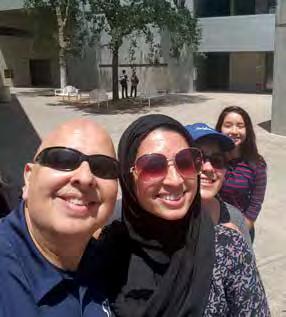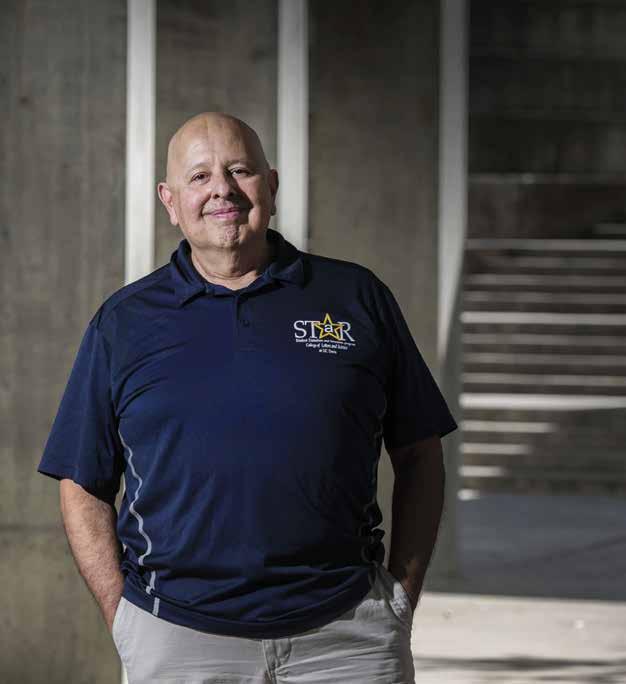
4 minute read
First Steps for First-Gen
BY KRISTIN EDE
Mike Valenzuela recalls his first day at college many years ago. As he made his way toward the exit sign at his new student orientation at California State University, Long Beach, he felt that he didn’t belong at college.
Advertisement
Overwhelmed after walking from table to table for two hours, he turned to make the trip home to Boyle Heights, the Los Angeles neighborhood where he grew up. Out of the corner of his eye, he felt someone watching him.
“Where I come from, if someone’s watching you, you pay attention,” he said.
When he turned, he found a tattooed veterano (veteran) who looked like he could have been one of his uncles. The older man threw his head back and nodded. “In my hood, that was a sign of respect and an invitation to talk to him,” Valenzuela said.
Valenzuela walked over to the Chicano studies table, where Professor Joe Lopez told him, “Sit down. You’re not going anywhere.” That interaction changed the course of his life. Lopez soon became his mentor, inspiring Valenzuela’s own career-long passion of supporting first-generation students.
Valenzuela’s family never expected him to go to college. His father came from a long line of soldiers, and Valenzuela was told to enlist in the U.S. Army after high school. However, his father died during his senior year, and Valenzuela says that is the only reason college ever became an option for him.

Mike Valenzuela and First-Generation First-Year Seminar students come together for a team-building exercise outside the Social Sciences and Humanities Building.
A career built on giving back
Today, Valenzuela has more than 20 years of experience mentoring, teaching, and supporting first-generation students in the College of Letters and Science’s Undergraduate Education and Advising office. More than 44% of students in the College are first-generation, and 38% of undergraduates are from underrepresented minority groups. To help them thrive, Valenzuela, along with academic advisors Janet Gutierrez and Frances Gamez and Professor Emeritus James McClain, developed the First-Generation First-Year Seminar, a course exclusive to the College. His first class began in 2015 with about 20 students. In 2019-20, more than 140 first-generation students participated.
Valenzuela understands the compounded weight a typical college “first” carries — from the first step onto campus to the first time lying awake in a town, like Davis, that is the cultural and economic opposite from where they grew up.
“Coming from many of these places that our students come from, they’re guarded. When I was in their shoes, it took me over a year to trust and let my guard down. I was way goofier than I ever realized,” he added with a laugh.
Ensuring a successful transition
The yearlong course eases the transition to life away from home. Students learn the difference between a goal and a mission, and why they should choose a major that aligns with their passions. They gain public speaking and communication skills, and are connected with campuswide resources like the Aggie Pantry, which provides food-insecure students with groceries free of charge.
Jorge Santiago (political science and history, ’21) transferred to UC Davis in fall 2018 and immediately took Valenzuela’s seminar. His biggest lessons learned were how to manage his time and ace challenging coursework.
“Before I took the seminar, I felt weird asking for help,” Santiago said. “The course breaks that fear down. It introduced me to peers who could relate to what I was going through, and opened so many doors to the full UC Davis experience.”

Mike Valenzuela, academic advisor for Undergraduate Education and Advising in the College of Letters and Science, has more than 20 years of experience in working with underrepresented minority and first-generation college students.
Another key goal of the course is to close the achievement gap by teaching students crucial study habits needed to succeed at a top-ranked public university.
“We push our students quite hard,” Valenzuela says. “That’s why nearly all of them are in good standing at the first quarter. That defies just about every statistic for first-generation student persistence that you can find.”
“Students who participated in the fall 2019 First-Year Seminar for first-generation students showed an average GPA of 3.16 over three terms, which is .18 points higher than all undergraduate first-generation students at UC Davis,” said Beth Floyd, director of Undergraduate Education and Advising.
The biggest challenges his students face are “imposter syndrome” and a lack of the tight-knit familial structure many grew up with, Valenzuela said. The cohort model used in his class helps students form close bonds and feel a sense of belonging. They often call Valenzuela their “college dad,” and say they found a second family through the experience.
A campuswide effort
Nearly 500 College of Letters and Science first-generation faculty and staff also give back through the campuswide First Generation Initiative, which aims to provide a sense of connection, access, and encouragement for first-generation students by sharing stories and resources. The initiative provides a department directory — from American studies to statistics to psychology — of first-generation College contacts that students may reach out to for support.
Whether through structured curriculum or a hand extended in help, the College is weaving a rich safety net of support for first-generation youth. As Valenzuela says, “You just never know when that student is going to stop in front of my table, just like me.”










